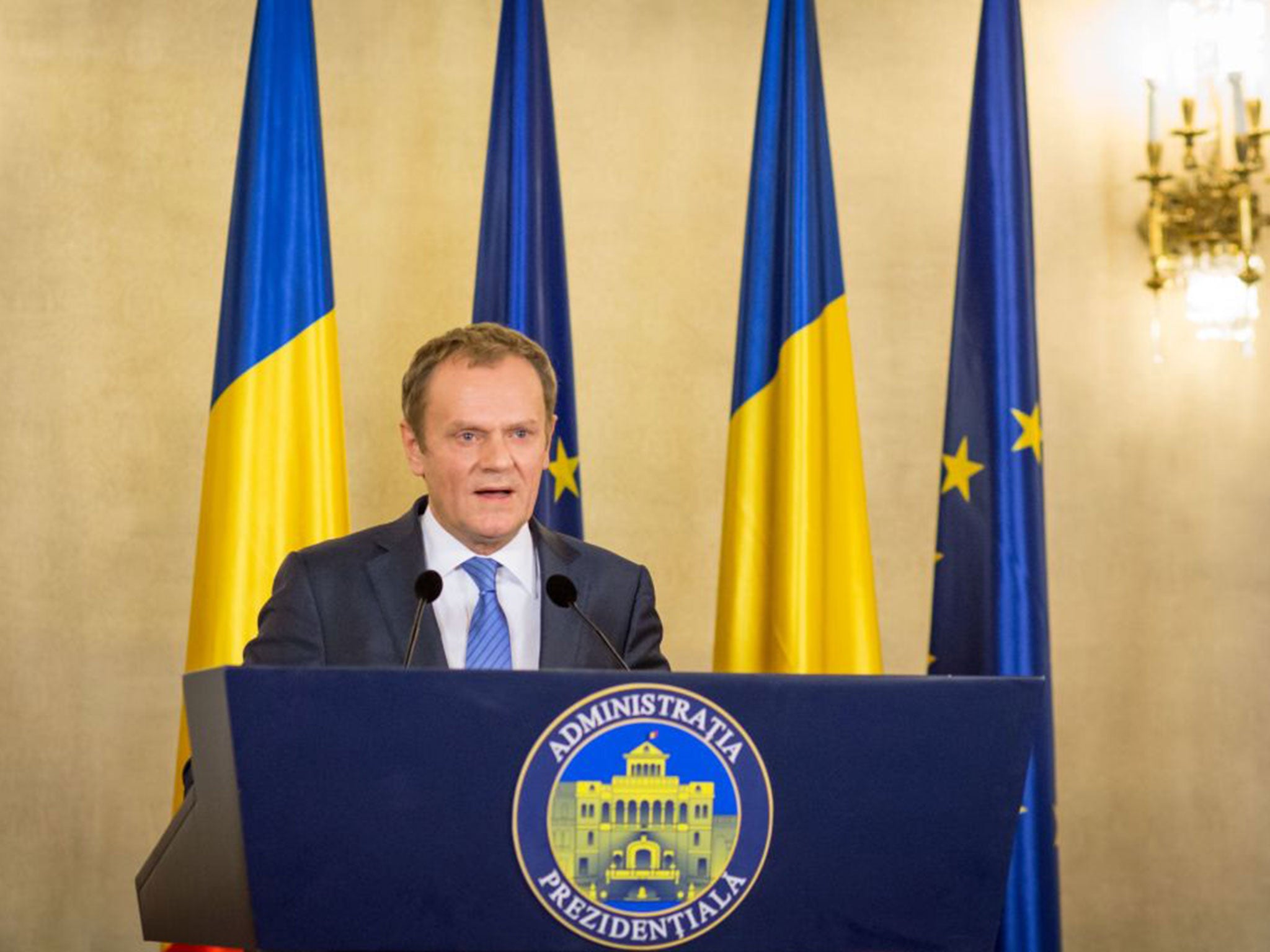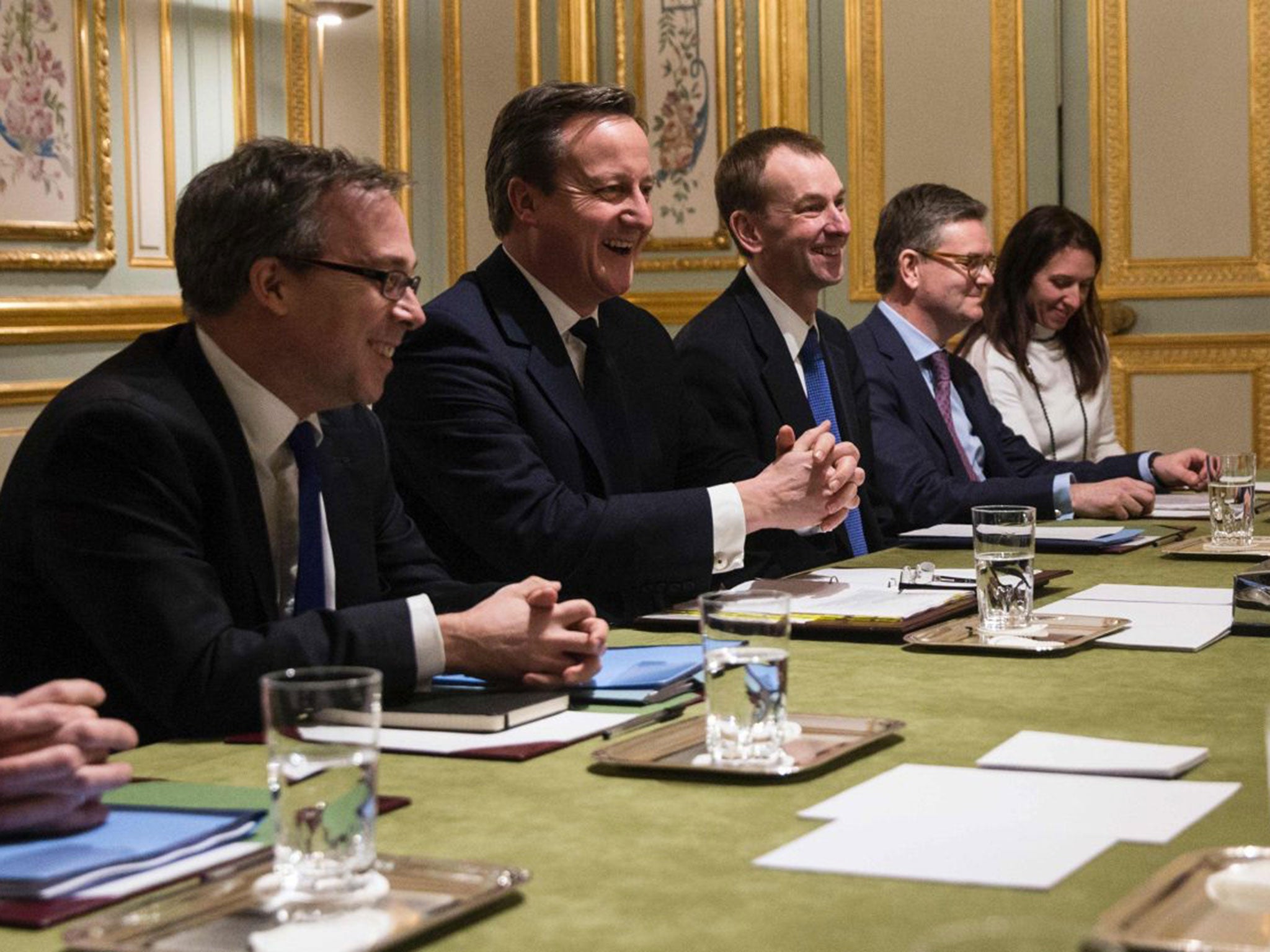Risk of EU breaking up is 'real', European Council President admits
Donald Tusk warns that talks over the UK's membership in the EU have reached a 'critical moment'

The risk of the EU breaking up is “real” and negotiations of the UK’s future membership remain “very fragile”, the President of the European Council has admitted.
Speaking ahead of the crucial summit on 18 February in which David Cameron will try to successfully renegotiate the terms of Britain’s membership, Donald Tusk warned that talks have reached a “critical moment”.
If Mr Cameron is able to secure the backing of other EU leaders at the summit in Brussels for his demands to renegotiate the terms of Britain’s membership.
If he clinches a deal, he will call an immediate Cabinet meeting on 19 February, after which Eurosceptic ministers such as Iain Duncan Smith would be free to join the “Brexit” campaign – sparking the beginning of the EU referendum battle in earnest
The potential timetable – leading to an in-out referendum in late June – emerged as David Cameron embarked on a last-minute flurry of diplomatic activity ahead of the summit.
Last night he held talks in Paris with President Francois Hollande and will meet key figures in the European Parliament on 16 February in an attempt to gain their backing.

Tory sources confirmed that the Cabinet would be called on 19 February in the event of a deal being struck the night before.
Mr Cameron hopes it will be finalised during a working dinner at the summit on late on 18 February, although sources in London and Brussels have stressed there are still several important sticking-points to be resolved. The Prime Minister’s spokeswoman said: “Nothing is agreed until everything is agreed.”
Donald Tusk, the president of the European Council, also warned last night that negotiations over Britain’s demands had reached a “critical moment”. Speaking after talks with the Romanian and French presidents, he tweeted: “The risk of break-up is real because this process is indeed very fragile.”
If agreement is reached in Brussels, the summit will end at lunchtime on 19 February, at which point Mr Cameron would hurry back to Downing Street to chair the meeting of senior ministers.
The Prime Minister had come under pressure – most vocally from Graham Brady, the chairman of the 1922 Committee – not to delay the Cabinet session until 22 February.
Campaigners to leave the EU had warned it would be seen as very unfair to leave the airwaves free over the weekend for supporters of EU membership while Eurosceptic ministers were still bound by collective Cabinet responsibility.
The timetable will now allow them to attend a major pro-Brexit rally being staged on 20 February and to give interviews over the weekend to make the opposite case from the Prime Minister.
Chris Grayling, John Whittingdale, Priti Patel and Theresa Villiers are expected to join Mr Duncan Smith in arguing for Brexit, while Michael Gove is understood to be agonising over which way to jump.
Sources would not be drawn on whether Mr Cameron would take the unusual step of calling a weekend Cabinet meeting if the negotiations in Brussels run over into late on 19 February or even 20 February.
Last night’s talks in Paris were due to focus on French concerns over Mr Cameron’s demand for Britain and other nations outside the single currency to be protected from decisions made by Eurozone countries. The French have raised objections that the UK is asking for special treatment for the City of London.
In Brussels, Mr Cameron will meet the European Parliament’s president, Martin Schulz, as well as leaders of the centre-right EPP and the Socialist groupings.
Downing Street has confirmed that key British reform demands, including curbs on in-work benefit payments to EU migrants and cuts in child benefit for youngsters living abroad, will require legislation in the Parliament even if they are backed by EU leaders. Both moves have encountered fierce opposition, particularly among MEPs from central and eastern European states.
Asked whether this could enable MEPs to block the changes after the referendum has taken place, the PM's spokeswoman replied: This would be a legally-binding document under international law, entered into by the 28 leaders of member states. There are a number of decisions subsequently which would have to be delivered by secondary EU law by co-decision with the European Parliament.
Meanwhile, HSBC warned that it could move 1,000 staff to Paris if the UK votes to leave the EU. Following a lengthy review, the group announced it was keeping its HQ in London, and chief executive Stuart Gulliver said the referendum result would not affect this decision. But he added: “If the UK leaves the EU it could have a significant impact on our non-ring-fenced bank - our trading room, corporate banking and investment banking ... We have 5,000 people in global banking and markets in London and I could imagine that around 20% of those would move to Paris.”
Don’t go two EU: Founding fathers urge UK in-vote
Two elder statesmen who helped build and shape the EU have urged Britain not to leave the union.
Valery Giscard d’Estaing, father of the European Monetary System that was the forerunner of the euro single currency, said keeping Britain in was well worth the trouble.
“I strongly hope they stay,” the former French president, who turned 90 this month, told Reuters.
“Britain has an ancient and very brilliant history, the good citizenship of its population, an old and deeply authentic democratic tradition and expertise in international trade,” he added.
Étienne Davignon, 83, the Belgian statesman and business leader who served in the European Commission under its only British president, Roy Jenkins, said the EU could adapt its structure to allow the eurozone to integrate further while keeping Britain in the EU’s single market. “This is not an impossible question to resolve,” he said.
Explainer: Who opposes what?
Cuts in child benefit for children living abroad
Being fiercely resisted by the so-called “Visegrad Four” – Poland, Hungary, the Czech Republic and Slovakia – whose nationals would be most affected by the plan.
Reducing in-work benefits for EU migrants
Again, the Visegrad Four are strongly opposed; the Hungarian Prime Minister has attacked the idea that Hungarians in Britain were “parasites”. They are being backed by Romania. Other countries also fear that the proposal undermines the principle of freedom of movement across the EU.
Protection from eurozone decisions for countries outside the single currency
France is sceptical, and suspects that the UK wants special treatment for the City of London.
The unexpected
Could debt-ridden Greece use the occasion to demand extra concessions in return for backing Britain’s deal?
Join our commenting forum
Join thought-provoking conversations, follow other Independent readers and see their replies
Comments
Bookmark popover
Removed from bookmarks